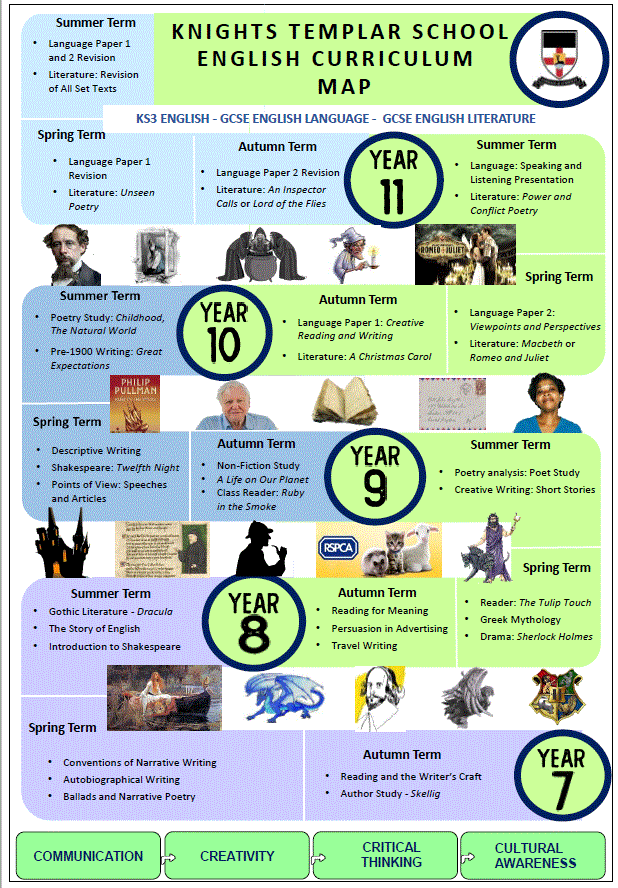Mathematics - Year 7
Click here to return to our English curriculum home page
Below you will find more specific information about the curriculum in English for Year 7 students, explaining to you what students will learn, when, why and how. There is also information about how parents/carers are able to support students in their learning, extra-curricular opportunities in this subject and how it links to other subjects and the wider world.
|
Subject Key Concepts #1 Creativity#2 Critical Thinking#3 Communication#4 Cultural AwarenessPlease click here for Subject Key Concepts. |

Please click here for PDF English Learning Journey |
Curriculum Overview for the year
|
Useful documents:
Please click here for a PDF of curriculum overview.
Please click here for a PDF of Mapping.
Please click here for a PDF of Autobiography.
Please click here for a PDF of Ballads and Narrative Poetry.
Please click here for a PDF of Gothic Study.
Please click here for a PDF of Narrative Writing.
Please click here for a PDF of Story of English.
While this information covers a broad range of areas, please do get in touch with the Subject Leader Mrs Weston if you have any questions.
Please click on the questions below to find out more.
How are groups organised?
Classes are set according to ability.
Students have 6 one hour lessons per fortnight.
What characteristics does a successful student have in this subject?
The most successful students in English are avid readers and writers who enjoy writing creatively and are able to interpret and analyse the work of writers from a range of backgrounds. They are insightful and can recognise and appreciate the ways in which writers craft their work to create meaning. They are able to use literary devices and linguistic features with confidence within their own writing and appreciate the importance of effective communication in all aspects of life.
How will students learn at this level?
- By: reading a wide range of texts.
- Reading examples of good creative writing.
- Experimenting with different forms of creative writing.
- Working collaboratively with texts.
- Researching contexts and backgrounds.
- Debating and expressing points of view.
- Practising written responses and creative writing.
How will students’ learning be assessed at this level?
At the end of each term you will be given a writing skills assessment which is marked for content, organisation and technical accuracy.
At the end of each unit you will be given an extended writing task which will be marked against a number of criteria from the reading and writing assessment grids.
You will be given clear and focused feedback on aspects you are doing well and guidelines on what you can do to improve your work.
When do key assessments take place?
End of Units – 2-3 each term
End of term Writing assessments – last two weeks of each term
There is no formal exam at the end of Year 7.
How can parents/carers support students’ learning?
- By reading together and showing interest in reading as a leisure activity.
- By encouraging the completion of all homework activities to a good standard.
- By reading all creative writing exercises and responding positively to ideas, offering constructive criticism where appropriate.
What equipment do students need for this subject?
Writing equipment
Reading book
How does this subject link to other subjects?
- Literacy – all subjects
- Analytical skills – most subjects
- Communication skills – all subjects
What websites or resources may be helpful to support students’ learning?
BBC Bitesize for KS3
https://www.nate.org.uk/file/2016/04/The-National-Curriculum-for-English-from-2015.pdf
What extra-curricular or enrichment opportunities are available for students in this subject at this level?
- KTS Best Books – writing a review for publication on the KTS website
- Creative Writing competitions
- Film club
What sort of careers can this subject lead to?
- Journalism
- Teaching
- Freelance writing
- Law
- Any career requiring high level literacy skills
What does student work look like in this subject at this level?
How does this subject support a broad and balanced curriculum, meeting the needs of all students, and developing traditional core skills?
Broad and balanced:
We cover a wide range of literature including pre-1900 texts and texts from other cultures.
We study a range of non-fiction texts, including topics relating to current issues, and encourage critical thinking skills.
Meeting the needs of all students:
We differentiate appropriately in all lessons, adapting unit tasks and all assessments to ensure they are challenging and accessible to all pupils.
Texts are selected according to the ability, strengths and interests of students.
TAs are used effectively to support students and we liaise with relevant agencies/staff to ensure students’ needs are met.
Traditional core skills:
Literacy is at the heart of the English curriculum. We also develop critical thinking skills, encourage the forming and expression of opinion and consider ethics and morality when studying literature in particular.
How does this subject promote creativity, critical thinking, practice, perseverance and resilience, and making links?
Creativity:
We develop thinking skills and encourage students to respond creatively to texts and ideas explored in lessons.
We encourage creative writing throughout the key stage, allowing students the opportunity to think of their own ideas and develop them in the way they wish.
Critical thinking:
We encourage pupils to think about a range of issues, ideas, language use and writers’ intentions throughout the course. They are expected to formulate their own responses and ideas, identifying strengths and weaknesses and expressing their own views clearly and articulately.
Practice, perseverance and resilience:
We encourage drafting and self-editing to enable pupils to identify their own errors and improve the quality of their writing.
We encourage students to complete longer writing tasks on a regular basis to develop writing resilience and read longer, challenging texts and extracts to develop reading resilience. Pupils are encouraged to persevere with challenging tasks and we break down more complex tasks to ensure they are less daunting and more accessible to all students.
Making links:
this subject links with history, geography, ethics and philosophy, art, modern languages, science, through the nature of the texts studied and the ideas explored throughout the course.
How does this subject encourage enrichment and the development of cultural capital, deep learning, and inclusivity?
Enrichment/cultural capital:
We study a range of literary texts from the Anglo Saxon Chronicles to 21st Century novels and poetry.
We introduce pupils to the literary canon including works by Shakespeare and Dickens. We study modern drama, poetry from across the world and non-fiction from a range of writers.
Substance/deep learning:
We study texts written for adult readers as well as children’s literature. Students are encouraged to think about mature ideas and themes and reflect on a range of issues.
All ideas are fully explored and tested to ensure pupils have a thorough knowledge and understanding of the skills taught throughout the year.
Open and inclusive:
We ensure all literature studied is relatable and accessible to all students. The themes reflect a wide number of concerns and issues, which are always dealt with appropriately and with sensitivity. We actively promote inclusivity in all of our units and within our classroom teaching.






